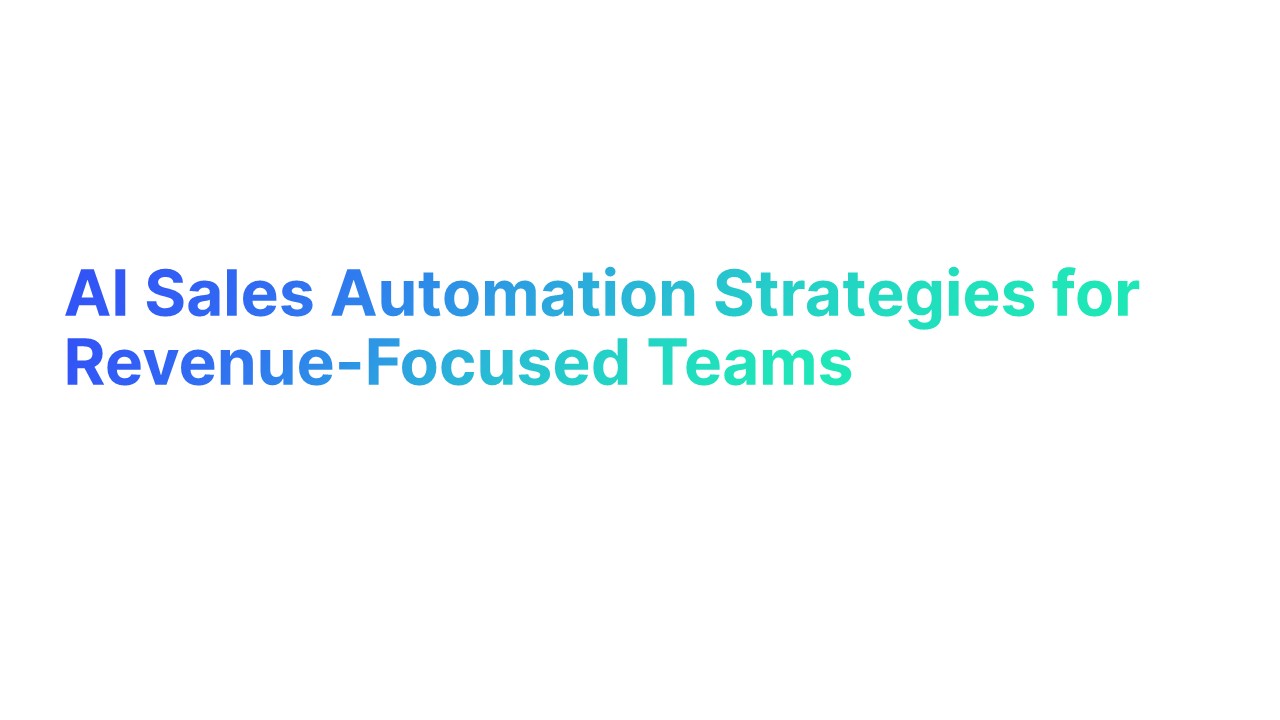What is Referral Marketing?
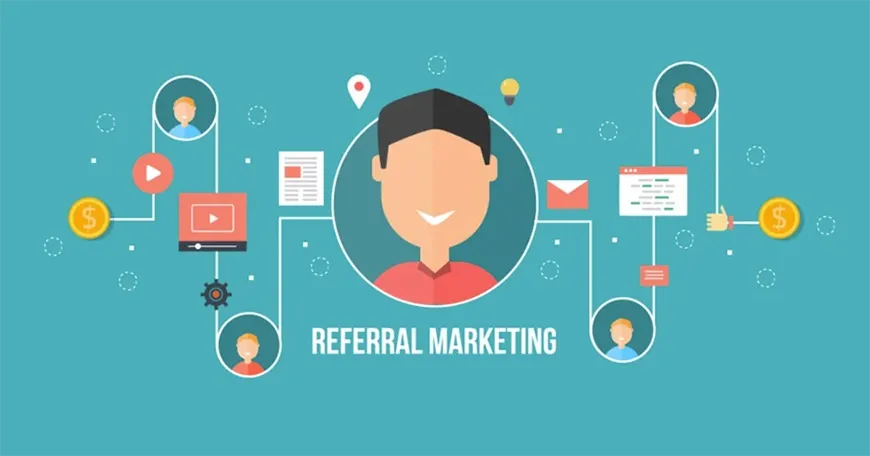
Referral marketing is a powerful strategy that leverages word of mouth to expand a company's customer base through existing customers. This approach encourages satisfied customers to introduce their family and friends to a product or service, typically motivated by incentives such as cash rewards, free products, or valuable rewards.
This type of marketing taps into personal networks, making it a highly effective form of customer acquisition because referred customers often trust the recommendations of people they know. It fundamentally shifts the focus from traditional advertising to fostering organic, customer-led growth through exceptional customer service and customer loyalty.
How Does Referral Marketing Work
Referral marketing program operates by providing current customers with a referral link or personalized promo codes that they can easily share with just a few clicks—via email marketing, social media, or even direct communication. When these links are used by new customers to make purchases or sign up for a service, the referrer usually receives a reward, which can vary from discounts to special offers.
This process not only motivates the original customer to share their referral link but also incentivizes new customers to become part of the referral cycle. Key elements of how referral marketing works include:
Incentivization
Customers are incentivized to share their positive experiences with a broader audience, often in exchange for rewards.
Simplicity
The referral marketing process is streamlined, typically requiring only a few seconds for customers to share a link or code.
Tracking and Analysis
Using referral marketin software, companies can track the success of their referral campaigns and understand better how many referrals convert into loyal customers.
Why Do You Need Referral Marketing Strategies
Referral marketing strategies are essential because they offer a cost-effective way to acquire new customers while increasing the lifetime value of existing ones. Unlike traditional marketing, referral marketing builds on the genuine endorsements of satisfied customers, offering a competitive advantage that can boost sales significantly. Key reasons to implement referral marketing strategies include:
- Increased Trust and Credibility: Referred customers are more likely to trust your brand when they hear about it from someone they know, leading to higher conversion rates and customer retention.
- Cost-Effective Customer Acquisition: Reducing dependence on traditional advertising, referral marketing lowers acquisition costs while potentially yielding customers with higher lifetime values.
- Strengthened Customer Relationships: By rewarding existing customers for referrals, you not only encourage loyalty but also deepen your engagement with them.
- Scalability: As more referrals lead to more customers, and those new customers become referrers themselves, referral marketing can create a self-sustaining growth loop.
By leveraging referral marketing strategies, businesses can effectively increase customer acquisition, build a more robust customer base, and ultimately, create a community of passionate customers who act as brand ambassadors. This approach not only encourages word of mouth but also provides a comprehensive strategy to maximize both reach and impact.
What Are The Benefits Of Referral Marketing?

Referral marketing, leveraging the networks of existing customers, offers numerous benefits for businesses aiming to grow sustainably.
It taps into word of mouth, social proof, and social currency, building a marketing strategy that naturally extends its reach to new and potentially more loyal customers. Here’s how it works:
1. Improves Word-of-Mouth Influence

Word-of-mouth marketing is a potent tool in a marketer’s arsenal, primarily because it comes from a trusted source. Referral marketing enhances this by incentivizing satisfied customers—those who have experienced your product or service and are happy with it—to share their positive experiences with family and friends. This not only broadens the reach but does so with a high level of credibility that is difficult to achieve through traditional marketing. Key aspects include:
Trust and Credibility: People trust recommendations from people they know much more than any other form of advertising.
Higher Conversion Rates: Recommendations by existing customers generally result in higher conversion rates as the recommendation comes with an implicit trust endorsement.
Cost Efficiency: Word-of-mouth is a low-cost marketing method, primarily running on the enthusiasm of your customers.
2. Strengthens Social Proof
Social proof is a psychological phenomenon where people assume the actions of others reflect correct behavior for a given situation. Referral marketing leverages social proof by showcasing that existing, satisfied customers endorse the product, suggesting that new customers will likely enjoy the same positive experience. This is particularly effective in:
Building Brand Trust: New customers are more likely to trust a brand that others visibly support and recommend.
Enhancing Customer Confidence: Seeing others vouch for a product or service increases a potential customer's confidence in making a decision.
3. Leverages Social Currency

Social currency relates to the idea that sharing valuable information increases an individual's status or standing in their social network. Referral marketing turns your product or service into social currency for your customers, allowing them to benefit from sharing something of value with others. This approach works because:
Value Exchange: Customers feel they are offering valuable insight or benefits to their peers, enhancing their own social standing.
Encourages Sharing: When customers benefit from sharing, whether through rewards or recognition, they are more likely to continue spreading the word.
4. Expands a Targeted Audience

Referral programs are excellent for reaching a targeted audience. Since existing customers know their peers' preferences and needs, they are likely to recommend your products or services to people with similar interests or requirements. This targeted approach helps in:
Increasing Relevance: Referrals tend to be more relevant to the potential customers’ needs, increasing the likelihood of adoption.
Speeding Up Customer Acquisition: Since the audience is more targeted, the path from awareness to purchase is often shorter compared to other marketing strategies.
5. Increases Customer Loyalty
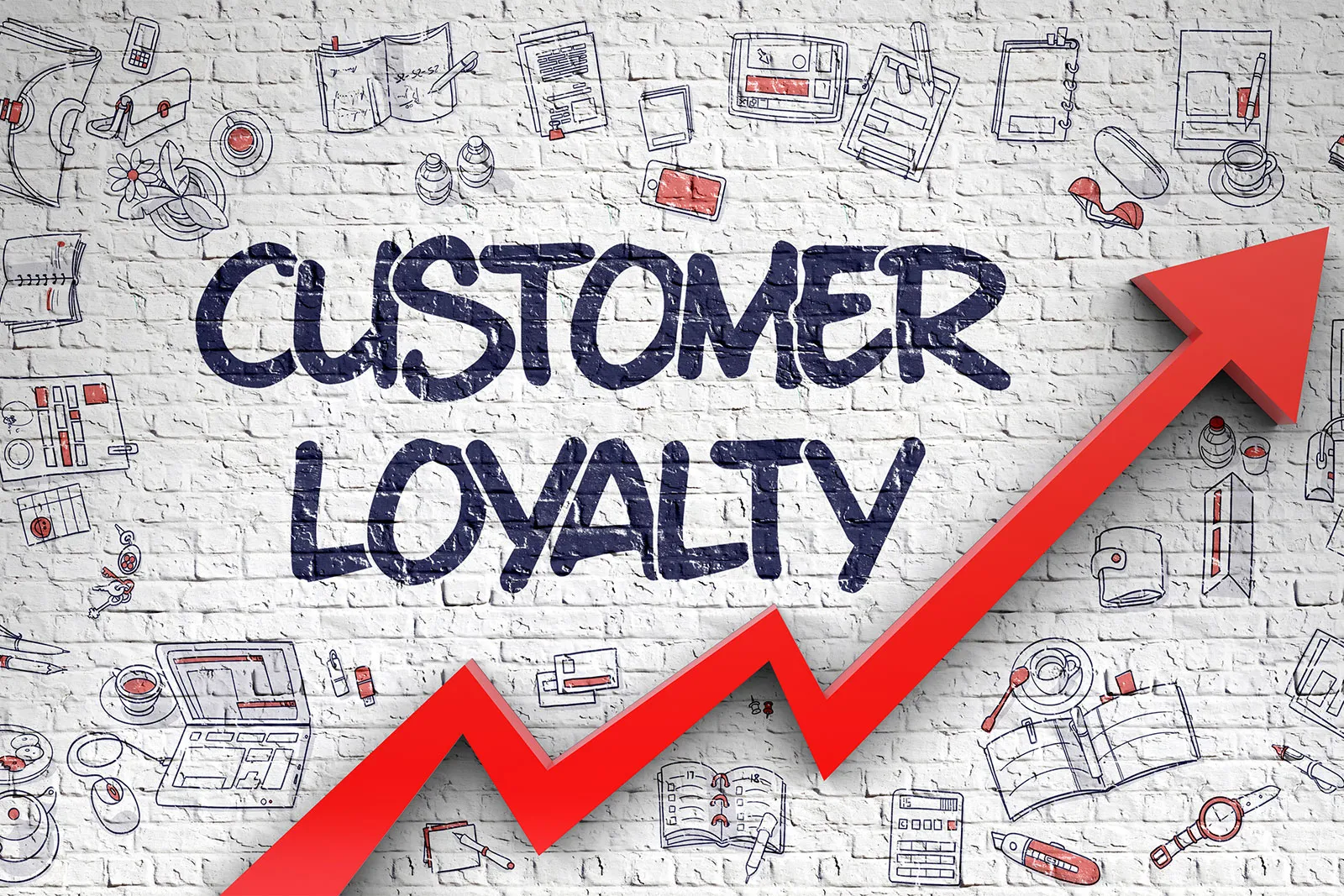
Referral marketing significantly boosts customer loyalty by rewarding current customers for their successful referrals. This not only shows appreciation but also ties their rewards to their continued engagement with the brand. Key benefits include:
Rewarding Loyalty: Programs that incentivize referrals often offer points, discounts, or exclusive offers that make existing customers feel valued.
Emotional Connection: By rewarding customers, you strengthen their emotional investment in the brand, which can lead to longer-term retention.
Higher Lifetime Value: Customers involved in referral programs typically have a higher lifetime value as they remain engaged with the brand for longer periods.
6. Introduces an Additional Engagement Channel for Existing Customers

Referral marketing introduces a dynamic engagement channel that allows existing customers to interact with the brand beyond traditional purchasing actions. This can include:
Social Sharing: Customers can use platforms like social media and email to share referral links, keeping them actively engaged with the brand.
Interactive Content: By involving customers in the referral process, companies can create more interactive and personalized experiences.
Continuous Engagement: Continuous interaction through referral activities helps keep the brand top-of-mind for existing customers.
7. Broadens Business Reach via Paid, Owned, and Earned Media

Referral marketing extends a business's reach across all types of media—paid, owned, and earned—which enhances overall visibility and market penetration. This broadening occurs through:
Earned Media: Positive word-of-mouth and customer testimonials act as earned media, enhancing credibility.
Owned Media: Referral programs promoted through a company’s owned channels like websites or newsletters increase visibility.
Paid Media: Some referral programs include paid advertising to boost the initial reach of referral campaign launches.
8. Fosters a Sharing Cycle

Referral marketing cultivates a perpetual sharing cycle, where each new customer brought in through a referral is likely to refer others. This sustainable cycle includes:
Viral Growth: As more individuals participate in the referral program, the potential for viral marketing increases.
Community Building: Successful referrals help build a community of users who are not just customers but also brand advocates.
Continuous Referral Incentives: Keeping the referral incentives attractive ensures that customers continue to share referral codes.
9. Develop an Economical Marketing Approach

Implementing a referral marketing program can be highly economical compared to traditional marketing strategies. This cost-effectiveness is driven by:
Lower Customer Acquisition Costs: Referrals reduce the need for extensive advertising spends by leveraging existing customers to bring in new ones.
Efficient Use of Resources: Referral marketing focuses on leveraging existing networks, which often requires less financial outlay than acquiring customers through new channels.
Greater ROI: Due to higher conversion rates and customer loyalty, referral programs often yield a higher return on investment.
By effectively utilizing referral marketing, businesses not only increase customer loyalty but also introduce efficient, engaging, and economical strategies into their overall marketing efforts. This holistic approach allows businesses, from SaaS companies to food delivery services, to maximize their market impact while fostering sustainable growth.
Types of Referral Marketing

Referral marketing leverages the networks of existing customers to grow a business's customer base efficiently and cost-effectively. There are several types of referral marketing strategies, each suited to different business needs and customer interactions. Here are six primary types:
1. Direct Referrals
Direct referrals occur when current customers directly recommend a product or service to family and friends. This type of referral is highly personal and leverages existing relationships to foster trust. Businesses can encourage direct referrals by:
Providing Exceptional Customer Service: Satisfied customers are more likely to share their positive experiences.
Making Referrals Easy: Simplify the referral process with straightforward tools that help customers share their referral codes or links directly.
2. Email Referrals
Email referrals use email marketing techniques to encourage customers to share products or services with their contacts. This can be particularly effective due to the personalized nature of email communication. Strategies include:
Email Referral Programs: Sending targeted emails that include referral incentives for both the referrer and the referred.
Integration with Email Campaigns: Incorporating referral prompts in regular newsletters or customer updates to keep the referral program top-of-mind.
3. Social Media Referrals
Social media platforms offer a vast arena for referral marketing, allowing customers to share referral links or codes within their broader social networks. This type can amplify reach quickly and includes tactics like:
Shareable Content: Creating content that is easy and appealing for users to share, such as special offers or engaging visuals.
Social Media Campaigns: Dedicated campaigns that encourage users to share their experiences and refer others to join or purchase.
4. Incentive-Based Referrals
Incentive-based referrals reward customers for referring new clients to a business. The rewards can be diverse, from discounts and cash rewards to special access or points. This type is highly effective because it:
Motivates Both Parties: Offers benefits to both the referrer and the new customer, making the deal attractive.
Encourages Repeated Referrals: Customers who see tangible rewards from referring others are more likely to continue promoting the brand.
5. Online Reviews
Online reviews act as a passive form of referral marketing where satisfied customers leave positive reviews on platforms like Google, Yelp, or industry-specific sites. These reviews:
Enhance Credibility: New customers often read reviews before making a decision, so positive feedback can sway potential customers.
Serve as Social Proof: Good reviews increase the social proof of a business, showing that it is trusted and valued by other consumers.
6. Influencer Advertising
Influencer advertising involves partnering with influencers to promote a product or service to their followers. Influencers act as a powerful referral source because they:
Reach Targeted Audiences: Influencers often have specific niches, allowing businesses to reach potential customers who are likely interested in their offerings.
Build Trust Through Association: Recommendations from a well-respected influencer can significantly boost a brand's credibility.
Each type of referral marketing has its strengths and can be used in various combinations to enhance a company's referral strategy, ensuring successful referrals and increased customer acquisition.
22 Referral Generation Strategy to Gain New Customers

Referral marketing programs are a powerful tool for expanding your customer base and deepening customer loyalty. By strategically implementing diverse referral marketing strategies, businesses can leverage existing customer relationships to attract new customers effectively. Here are detailed strategies to help you achieve this:
1. Implement Cash Incentives: Offer Cash Rewards to Encourage Customers

Cash incentives are a straightforward and highly effective way to encourage existing customers to refer new ones. By offering cash rewards for each successful referral, you create a compelling motive for customers to share their positive experiences with others. This strategy not only motivates the referrer but also often results in more enthusiastic endorsements, which can lead to higher conversion rates.
- Immediate Appeal: Cash is a universally appealing reward that can quickly grab the attention of potential referrers.
- Easy to Understand: Customers easily grasp the benefit, making the decision to participate simple.
2. Introduce a Points-Based System: Use a Points System that Rewards Customers
A points-based system adds a gamified element to the referral marketing program, allowing customers to accumulate points for various actions, including making referrals. These points can then be redeemed for rewards such as discounts, special services, or exclusive products. This method not only incentivizes referrals but also encourages ongoing engagement with the brand.
- Increased Engagement: Customers stay engaged with your brand as they accumulate points and aim for higher-value rewards.
- Flexibility: Offers a variety of rewards, catering to different customer preferences.
3. Unlock Access to Free Products: Provide Free Products as Incentives

Offering free products as a referral incentive is an excellent strategy, particularly for businesses with tangible goods. This approach allows potential customers to experience your product firsthand at no cost, which can significantly boost conversion rates and provide a direct taste of your brand’s value.
- Direct Experience: Free products let new customers experience the quality and value of your offerings firsthand, enhancing their likelihood to continue using your service.
- Word-of-Mouth Boost: Satisfied customers who received a free product are likely to share their positive experiences with others.
4. Optimize the Timing of Referral Requests: Strategically Request Referrals
The timing of when you ask for a referral can significantly impact the effectiveness of your request. Optimal times include after a customer has received exceptional service, when they’ve expressed satisfaction with a product, or after they’ve made a repeat purchase.
- Customer Satisfaction Peaks: Asking for referrals when customers are most satisfied increases the likelihood of participation.
- Lifecycle Milestones: Key moments in the customer lifecycle, such as after an onboarding process or a successful customer support interaction, are ideal for making referral requests.
5. Enhance Engagement Through Mobile Apps: Leverage Mobile Apps
Mobile apps offer a direct channel to enhance customer engagement and facilitate referral programs. By integrating referral features directly into your mobile app, you make it easy for users to share referral codes or links with just a few taps. This approach is especially effective for businesses like food delivery services or SaaS companies, where app usage is high.
- Convenience and Accessibility: Mobile apps provide a convenient way for customers to engage with referral programs anytime, anywhere.
- Push Notifications: Use notifications to remind users to share referral codes or to notify them of rewards, increasing the likelihood of participation.
6. Supply Ready-to-Use Referral Templates: Provide Templates to Make it Easier for Customers
Providing customers with ready-to-use referral marketing program templates simplifies the process of referring others and can significantly increase the number of successful referrals. These templates can include pre-written emails, social media posts, or text messages that customers can quickly customize and send to potential referrals.
- Ease of Use: Templates remove the hassle of creating content from scratch, making it easier for customers to participate.
- Consistency in Messaging: Ensures that the key benefits and messages about your brand are communicated clearly and consistently.
7. Adopt a Referral Marketing Platform: Use Tech to Manage Referral Campaigns.
Utilizing a dedicated referral marketing strategy platform can streamline the management of your referral programs and enhance their effectiveness. These platforms often offer tools to track referrals, manage rewards, and analyze the performance of your campaigns, providing valuable insights that can help optimize your strategy.
- Automation: Automates critical processes such as tracking referrals and issuing rewards, reducing manual effort and minimizing errors.
- Analytics and Reporting: Provides detailed insights into program performance, helping you make data-driven decisions to improve your campaigns.
8. Develop Shareable Content: Create Content That Can Be Shared Within Customer Networks.
Creating compelling and shareable content is crucial for driving referrals. This content can range from informative blog posts and engaging videos to infographics and interactive tools that encourage users to share them with their networks. The content should not only be informative but also entertaining or beneficial enough to incentivize sharing.
- Viral Potential: Content with viral potential can significantly increase reach and attract new customers.
- Engagement: High-quality, engaging content fosters deeper connections with your brand, which can translate into more frequent and enthusiastic referrals.
9. Deliver Exceptional Customer Service: Focus on Customer Satisfaction
Exceptional customer service is foundational to any successful referral marketing programs. Happy customers are more likely to recommend your services to others. Focus on providing timely, responsive, and above-and-beyond service to ensure customer satisfaction and encourage word-of-mouth referrals.
- Customer Retention: Excellent service contributes to higher customer retention rates.
- Brand Advocacy: Satisfied customers become brand advocates, naturally promoting your business to potential customers.
10. Rebrand Referral as Personal Recommendations: Personalize the Referral
Transforming the concept of "referrals" into "personal recommendations" can significantly enhance the effectiveness of your referral marketing campaigns. This strategy personalizes the referral process, making it feel less like a marketing tactic and more like a friendly suggestion among family members and friends. It emphasizes the trust and personal connection in the recommendation, making potential customers more receptive.
- Emotional Engagement: By personalizing referrals, you tap into the emotional connections that people have with each other, which can be more persuasive than traditional marketing messages.
- Enhanced Trust: Recommendations from trusted sources like family or friends carry more weight and can lead to higher conversion rates.
11. Address Concerns About Asking for Referrals: Overcome Hesitancy by Framing as Requests for Help.
Many customers may hesitate to make referrals due to uncertainty about how it might be perceived. Address these concerns by framing the referral request as a form of help or support for the business. This can motivate customers to act, as it appeals to their willingness to assist someone they have a good relationship with.
- Ease Psychological Barriers: Encouraging customers to see referrals as helping the business can reduce the discomfort associated with asking for favors.
- Increase Participation: When customers feel they are aiding in your success, they are more likely to make a referral.
12. Leverage Your Entire Network: Utilize all Connections to Expand Referral Potential
Maximize the reach of your referral program by leveraging every part of your network, including employees, partners, and even current customers. Encourage everyone connected to your business to spread the word, thereby amplifying the impact and reach of your referral efforts.
- Broaden Reach: Utilizing diverse channels and networks can significantly increase your program’s exposure and effectiveness.
- Encourage Employee Advocacy: Employees can be powerful advocates for your brand, especially in industries like food delivery or SaaS where insider recommendations carry significant weight.
13. Request Specific Introductions: Clearly define the ideal customer profile when asking for referrals.
When soliciting referrals, be specific about the type of customers you are looking for. This clarity helps referrers identify the best potential customers from their own networks, making the referral more targeted and likely to convert.
- Targeted Referrals: Specific criteria help ensure that the referrals you receive are more likely to be interested in your product or service, which can improve conversion rates.
- Efficient Use of Resources: Focusing on quality rather than quantity in referrals ensures better use of marketing resources and higher satisfaction among newly acquired customers.
14. Set Daily Goals for Referrals: Aim for a specific number of introductions each day to maintain momentum.
Setting daily goals for referrals helps maintain focus and momentum within your referral program. By establishing clear targets, you can better motivate and measure the performance of your referral efforts, keeping the program dynamic and top of mind.
- Maintain Engagement: Daily goals keep your team and participating customers engaged with the referral program consistently.
- Measure Success: Regular targets provide immediate feedback on the program’s performance, allowing for quick adjustments to improve results.
15. Quantify Your Referral Goals: Hold yourself accountable by setting measurable targets.
Setting quantifiable targets is crucial for managing and enhancing the effectiveness of your referral program. By establishing specific, measurable goals, you can track progress, hold your team accountable, and fine-tune strategies to improve performance. This approach ensures that your referral marketing efforts are aligned with broader business objectives and yields actionable insights.
- Set Specific Objectives: Determine the number of referrals, conversion rates, and any specific customer demographics you aim to achieve.
- Regular Monitoring: Implement systems to regularly monitor these metrics, allowing for timely adjustments to optimize the program's effectiveness.
16. Host Exclusive Events: Organize Events only Accessible Through Invitations.
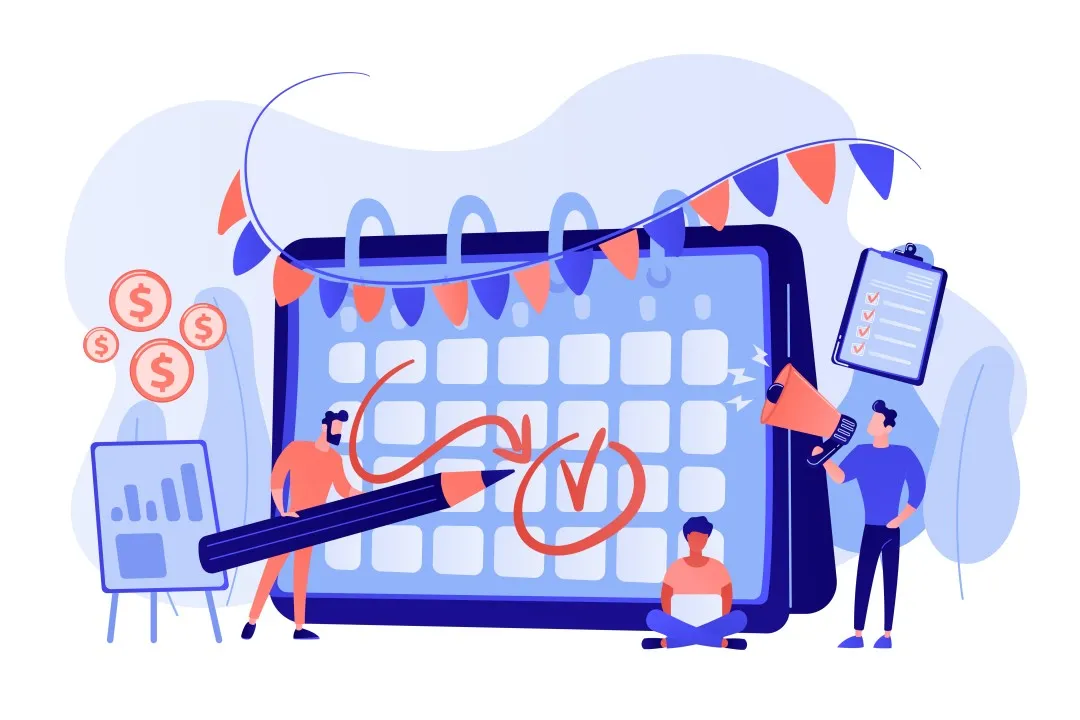
Exclusive, invitation-only events can significantly enhance the appeal of your referral program. Such events not only provide a unique value proposition but also create a sense of exclusivity and privilege. They can be particularly effective in industries where being part of a community or having insider access is highly valued.
- Enhance Engagement: Exclusive events foster deeper connections between your brand and its customers.
- Create Buzz: The allure of exclusive access encourages customers to participate in the referral program to gain entry to these special events.
17. Incorporate Referral Links: Use Links That Track Referrals
Utilizing referral links is a practical way to streamline your referral program. These links facilitate the tracking of referrals and the attribution of rewards automatically. This not only simplifies the management of the program but also enhances the user experience by making the process seamless and transparent.
- Ease of Use: Referral links are easy for customers to share via social media, email, or even text.
- Accurate Tracking: Links enable precise tracking of referrals and conversions, ensuring fair and timely rewards distribution.
18. Build a Community Around Your Brand: Encourage Customers to Engage More
Creating a community around your brand turns ordinary customers into loyal advocates. A strong community fosters an ongoing dialogue between customers and your brand, enhancing customer loyalty and providing valuable feedback. Community engagement can be facilitated through social media platforms, dedicated forums, or regular community events.
- Strengthen Brand Loyalty: A vibrant community increases emotional attachment to the brand, which can translate into more frequent referrals.
- Leverage User-Generated Content: Encourage the community to share their experiences and stories, which serves as authentic content that can attract new customers.
19. Expand Through Social Media: Tap Into Social Platforms to Improve Your Referral Reach.
Social media platforms are powerful tools for amplifying your referral marketing campaign. By leveraging the extensive reach and engagement capabilities of platforms like Facebook, Instagram, and Twitter, you can significantly increase the visibility of your referral program. Engaging content that encourages shares and conversations can help spread the word organically, tapping into each user's network of friends and followers.
- Create Shareable Content: Develop content that is easy for users to share, such as posts that highlight the benefits of your referral program or user-generated content that shows real customers benefiting from referrals.
- Use Social Proof: Highlight successful referrals and testimonials from satisfied customers to enhance credibility and entice others to participate.
20. Streamline Processes with Referral Software: Use Software to Automate Referral Program.
Implementing referral software can significantly streamline the management of your referral programs. This software automates the tracking of referrals, attribution of rewards, and provides analytics on the performance of your referral campaigns. Automation ensures that the process is efficient, transparent, and scalable, which can handle increasing volumes of referrals as your program grows.
- Efficient Tracking and Management: Referral software provides tools to track the progress of each referral and manage rewards without manual oversight.
- Analytics and Optimization: Use built-in analytics to monitor the effectiveness of your referral strategies and make data-driven decisions to optimize your campaigns.
21. Collaborate with Influencers: Partner With Influential Figures to Widen Your Referral Program.

Partnering with influencers can dramatically expand the reach and effectiveness of your referral program. Influencers have large and engaged audiences that trust their recommendations. By collaborating with influencers who align with your brand values, you can tap into their networks and gain access to potential customers who are likely to be interested in your offerings.
- Targeted Audience Reach: Influencers can introduce your brand to a highly engaged, relevant audience.
- Increased Credibility: Recommendations from respected figures can significantly enhance your brand's credibility and trustworthiness.
22. Utilize Chatbots for Engagement: Integrate Chatbots to Assist With and Promote Referrals.
Chatbots can be a highly effective tool for enhancing engagement within your referral marketing strategy. By integrating chatbots on your website, social media pages, or even in your mobile apps, you can provide immediate assistance to customers who have questions about your referral program. Chatbots can also proactively prompt users to participate in the referral program and guide them through the process.
- Instant Customer Support: Chatbots provide real-time assistance, answering questions and resolving issues quickly to maintain customer satisfaction.
- Automated Promotion: Use chatbots to automatically introduce your referral program to new and existing customers, explaining the benefits and how to participate effectively.
By employing these advanced strategies, you can ensure that your referral program not only reaches a broader audience but also operates efficiently, engages effectively, and scales seamlessly as your brand grows.
Conclusion
Key takeaways referral marketing strategies can significantly boost both customer acquisition and retention. By adopting methods like leveraging mobile apps, using referral software, and engaging through social media, your business can create a dynamic and efficient referral program.
Integrating modern technologies such as chatbots and influencer partnerships amplifies your campaign's reach and impact. These strategies ensure that your referral efforts are robust and continuously evolving, positioning your business for sustained growth and a strong customer base in a competitive marketplace.
Further Readings
Enhance your referral generation strategy with these resources, each offering actionable insights and effective methods to boost your business's growth through referrals.
Crafting an Effective Email Referral Program: Learn how to leverage email as a powerful tool for referral generation. This guide provides strategies and insights on setting up a referral program that encourages your existing customers to bring in new leads. Read more here.
Navigating the Sales Cycle Through Effective Referrals: Gain a comprehensive understanding of how referrals fit into the various stages of the sales cycle. This resource offers detailed explanations on integrating referral strategies from prospecting to closing. Explore the guide here.
Finding Marketing Leads Through Referrals: Discover techniques for identifying and cultivating marketing leads that can be primed for your referral programs. This article outlines actionable methods to enhance your lead generation through strategic referrals. Learn more here.
Acquiring Free Email Leads for Referral Campaigns: Uncover ways to expand your email list without cost, which can be a crucial part of a successful referral strategy. This guide offers nine innovative ideas to increase your list and boost your referral efforts. Check it out here.
Using Social Media to Amplify Referral Programs: Explore how to use social media platforms to enhance your referral strategies. This resource provides insights into leveraging social networks to generate and convert leads into participants in your referral programs. Find out more here.
These resources are specifically curated to help you develop, enhance, and optimize your referral generation strategy, using a mix of email, social media, and comprehensive sales cycle integration to maximize your business growth.

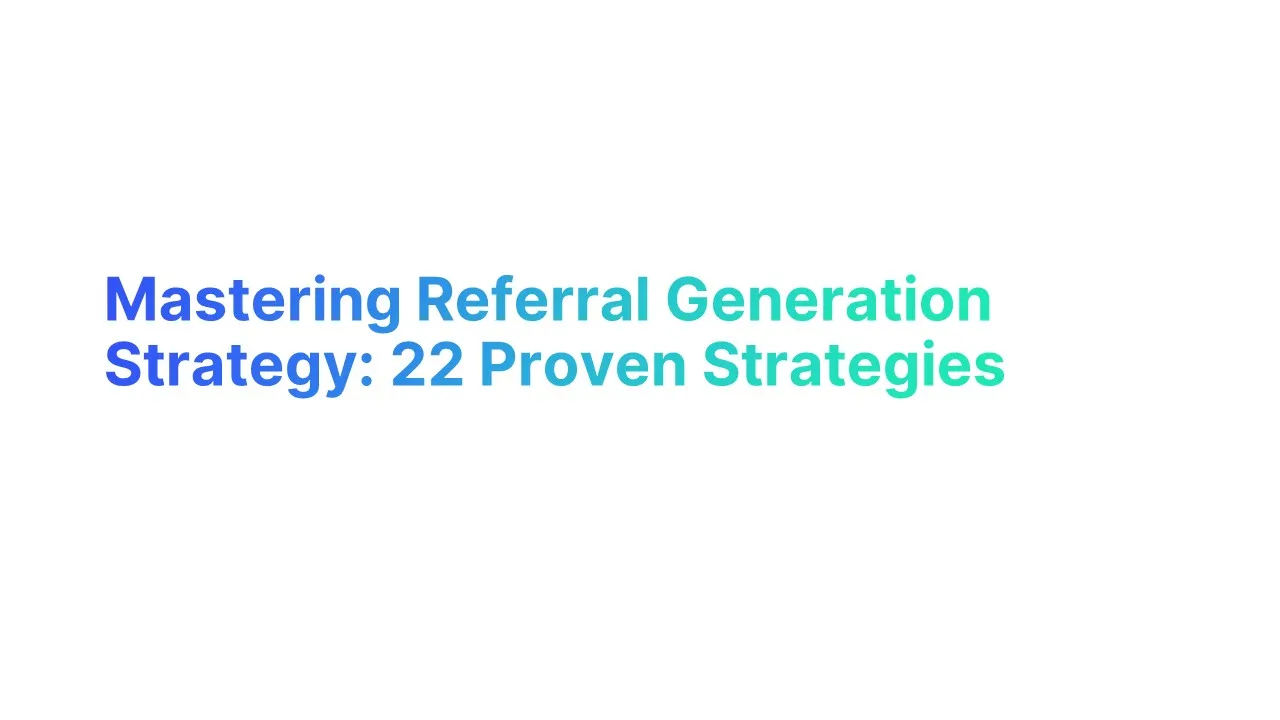



.webp)

